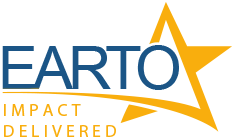PCCL (UAR) – With UV-light towards the next generation of low-allergenic surgical gloves
EARTO Innovation Awards 2016 – Impact Delivered Category
First Prize
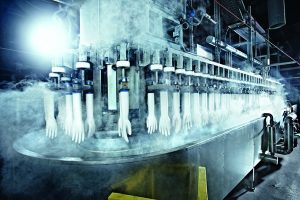
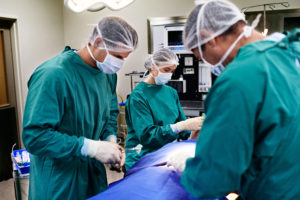 The prevention of allergenic reactions related to medical gloves was the driving force in the joint research work of the Polymer Competence Center Leoben (PCCL), EARTO member through UAR, and Semperit, producer of medical gloves. By developing an innovative chemistry for the crosslinking of latex with a cutting-edge production process, the worldwide first low-allergenic glove is commercially available since 2013. These new gloves may improve the quality of life of 1 to 3 million healthcare workers in Europe, while the social, health and economic impact for the general population could go much beyond.
Healthcare is one of the largest economic sectors in the EU, accounting for around 17 million jobs. Employees in such industry have to face critical operational safety risks, some of which are due to the frequent use of latex gloves and contact with other rubber-related medical products like syringes. The adverse health reactions to these latex products range from serious skin reactions to asthma and it can even be lethal in some cases.
The prevention of allergenic reactions related to medical gloves was the driving force in the joint research work of the Polymer Competence Center Leoben (PCCL), EARTO member through UAR, and Semperit, producer of medical gloves. By developing an innovative chemistry for the crosslinking of latex with a cutting-edge production process, the worldwide first low-allergenic glove is commercially available since 2013. These new gloves may improve the quality of life of 1 to 3 million healthcare workers in Europe, while the social, health and economic impact for the general population could go much beyond.
Healthcare is one of the largest economic sectors in the EU, accounting for around 17 million jobs. Employees in such industry have to face critical operational safety risks, some of which are due to the frequent use of latex gloves and contact with other rubber-related medical products like syringes. The adverse health reactions to these latex products range from serious skin reactions to asthma and it can even be lethal in some cases.
 Up to 6% of the general population exhibit a sensitivity to latex-related products
Up to 6% of the general population exhibit a sensitivity to latex-related products  New gloves commercialised in 2013 may improve the quality of life of 1 to 3 million health care workers in Europe
New gloves commercialised in 2013 may improve the quality of life of 1 to 3 million health care workers in Europe First UV production line provides production capacity of > 20 million pairs of gloves per year
First UV production line provides production capacity of > 20 million pairs of gloves per year More information about this innovation
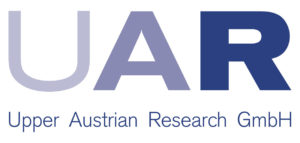 UAR is an Austrian Association of RTOs promoting innovative solutions at the crossroads where fundamental research meets applied research and offering businesses access to R&D of the highest quality.
www.uar.at
Member of UAR, the Polymer Competence Center
UAR is an Austrian Association of RTOs promoting innovative solutions at the crossroads where fundamental research meets applied research and offering businesses access to R&D of the highest quality.
www.uar.at
Member of UAR, the Polymer Competence Center 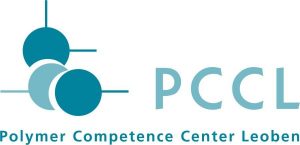 Leoben GmbH (PCCL) is the leading Austrian “Center of Excellence” for cooperative research in the area of polymer engineering and sciences.
www.pccl.at
Leoben GmbH (PCCL) is the leading Austrian “Center of Excellence” for cooperative research in the area of polymer engineering and sciences.
www.pccl.at
< Previous Next >
